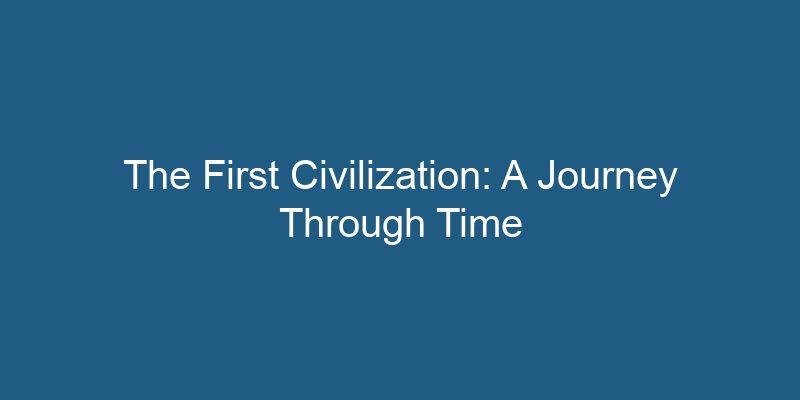- Introduction
- 1. Defining Civilization
- A Journey To The Beginning Of Time
- 2. Theories on the First Civilization
- 2.1 Mesopotamia: Cradle of Civilization
- 2.2 Ancient Egypt: Land of Pharaohs
- 2.3 Indus Valley Civilization: A Mystery Unearthed
- 3. Evidence of Early Civilizations
- 3.1 Pottery and Artifacts
- 3.2 Architecture and Monumental Structures
- 3.3 Written Records
- 4. Advancements and Contributions of Early Civilizations
- 4.1 Agricultural Innovations
- 4.2 Written Language and Communication
- 4.3 Technological Advancements
- 5. Conclusion
Introduction
The question of which civilization was the first to emerge on Earth is a topic that has fascinated historians, archaeologists, and enthusiasts for centuries. Tracing back the origins of human civilization is no easy task, as it requires piecing together fragments of the past and analyzing archaeological evidence. In this article, we will delve into the subject of the first civilization, exploring various theories, evidence, and advancements that shaped our understanding of ancient civilizations.
1. Defining Civilization
Before we can determine which civilization was the first, it is important to establish a clear definition of what constitutes a civilization. A civilization is typically characterized by complex social, political, economic, and cultural structures. It includes the development of urban settlements, agriculture, writing systems, organized religion, and advancements in technology and art.
A Journey To The Beginning Of Time
2. Theories on the First Civilization
Scholars and researchers have proposed several theories regarding the first civilization. Let’s explore some of the prominent ones:
2.1 Mesopotamia: Cradle of Civilization
Mesopotamia, located in modern-day Iraq, is often regarded as one of the earliest cradles of civilization. The Sumerians, who inhabited this region around 4000 BCE, developed the first known writing system, cuneiform, and established city-states such as Uruk and Ur.
2.2 Ancient Egypt: Land of Pharaohs
Another contender for the first civilization is Ancient Egypt. The Nile River provided a fertile environment for agricultural development and allowed the Egyptians to establish a centralized state ruled by pharaohs. The construction of monumental structures like the pyramids showcases their advanced engineering skills.
2.3 Indus Valley Civilization: A Mystery Unearthed
The Indus Valley Civilization, located in present-day Pakistan and northwest India, flourished between 2600 BCE and 1900 BCE. With well-planned cities like Mohenjo-daro and Harappa, advanced drainage systems, and evidence of long-distance trade, it is considered one of the earliest urban civilizations.
3. Evidence of Early Civilizations
To determine the first civilization, researchers rely on archaeological evidence unearthed from various sites around the world. Some key pieces of evidence include:
3.1 Pottery and Artifacts
The discovery of pottery and artifacts can provide valuable insights into the lifestyle, technology, and artistic achievements of early civilizations. These objects can help archaeologists determine the level of sophistication and cultural practices of ancient societies.
3.2 Architecture and Monumental Structures
The construction of impressive architectural structures, such as temples, palaces, and tombs, is indicative of advanced engineering and organizational skills. The size and complexity of these constructions serve as evidence of a developed civilization.
3.3 Written Records
The existence of written records is a crucial factor in identifying civilizations. Ancient texts, inscriptions, and documents provide insights into the social, political, and economic systems of past societies. The decipherment of scripts like hieroglyphics and cuneiform has significantly contributed to our understanding of early civilizations.
4. Advancements and Contributions of Early Civilizations
Regardless of which civilization was the first, many early societies made remarkable advancements and contributions that shaped human history. Some notable achievements include:
4.1 Agricultural Innovations
The development of agriculture revolutionized human societies by providing a stable food supply. Techniques like irrigation, crop rotation, and domestication of animals allowed civilizations to flourish and support larger populations.
4.2 Written Language and Communication
The invention of writing systems enabled civilizations to record information, communicate across distances, and preserve knowledge for future generations. Writing played a vital role in governance, trade, literature, and intellectual pursuits.
4.3 Technological Advancements
Early civilizations contributed to technological advancements, such as the wheel, metallurgy, shipbuilding, and urban planning. These innovations laid the foundation for further progress in various fields.
5. Conclusion
While the debate on the first civilization continues, it is evident that several ancient societies played a significant role in shaping human history. Mesopotamia, Ancient Egypt, and the Indus Valley Civilization are just a few examples of early civilizations that left a lasting impact. By studying their advancements, we gain a deeper understanding of our collective past and the foundations upon which modern civilizations have been built.

